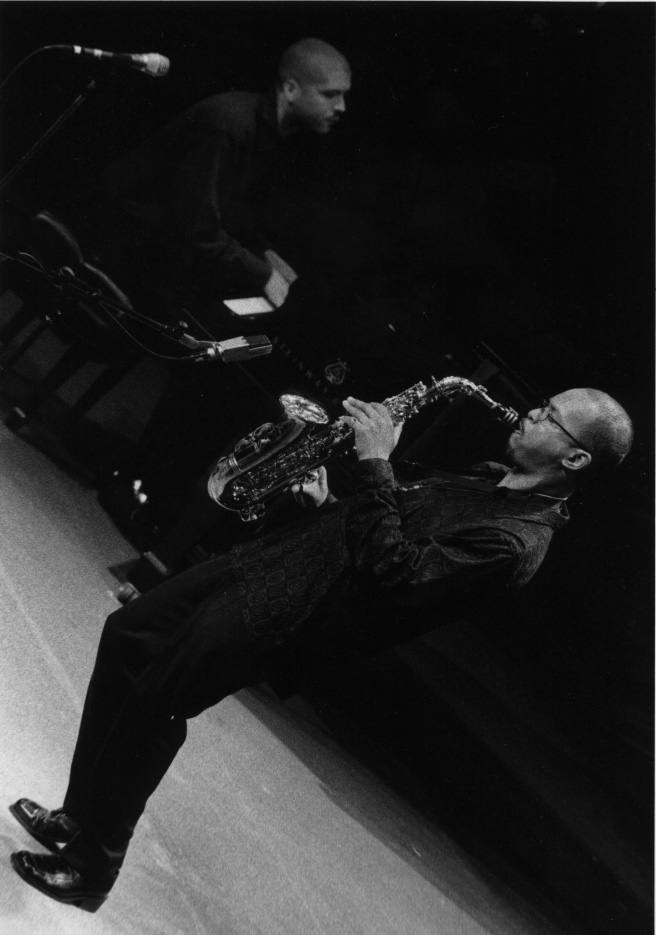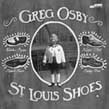
A FIRESIDE
CHAT WITH GREG OSBY
(May
7, 2003)
For as long as I have known Greg Osby, he has been searching. Perhaps
that is why I admire Osby the man, the searching. Osby has been searching,
is searching, and odds are will continue to search. So I really have no
business speaking for him and will give the mic to Oz, the man, the myth,
the searcher, unedited and in his own words. Although, I will part on
this note. Everybody have fun tonight. Everybody Wang Chung tonight.
FRED
JUNG: New record, new band.
GREG
OSBY: Jason didn't leave the band.
FJ: You encouraged him to focus on his own trio.
GREG
OSBY: Yeah, I encouraged him to do so and I wanted to vacate the position
and make it available to another younger player who needed an opportunity.
Secondly, I reluctantly did this project. I went into it kicking and screaming
because I really don't like tribute records or doing songbook type projects.
The only reason I consented was because I would radically alter these
environments and change the arrangements and customize them to fit my
own purposes. That led to the selection process. I wanted to get players
who were familiar with this catalog, but who also had characteristics
in their playing that would befit the totality of the project. That is
why I arrived at calling Nicholas Payton because of the New Orleans discipline
of playing in those street bands and brass groups. He was a natural choice.
Bob Hurst being the musician's musician bassist, who can and will do anything
that he is called upon to do. That was a no brainer as well.
FJ: We have spoken about avoiding just these major label trappings. Nic
has done his share of concept albums for Verve. He comes with a lot of
baggage.
GREG
OSBY: Calling Nic was consistent with my declaration New Year's Day that
I would seek out players that I had admired from afar for years and years,
but we had never shared a bandstand or did anything kind of creative project
together. I am getting older and I see these cats in airports more than
I do on the bandstand. It is ridiculous. In pervious generations, everyone
knew each other really well and played together regularly. It was a common
language. Now everybody lives in these bubbles and I don't know Nic's
music personally and I don't know Wynton's music personally. Wynton and
I played together for the first time two weeks ago. We did a couple of
nights in New York and it was just ridiculous. I have known the cat over
twenty years and we have never really played together. We talked a lot.
This year, I have played with more different people and I have fed off
of their information and their energy. That is why Nic came to mind. I
hadn't really considered the concept album thing because he was just probably
playing by the rules, but sometimes playing by the rules isn't the best
way to play because now he isn't on that label anymore. It is all building
blocks and stepping stones and certain moves that players make, they won't
do again. Hopefully, it is a learning experience.
FJ: Are you happy with St. Louis Blues?
GREG
OSBY: Absolutely, I knew exactly what would happen. The players fell right
in the pocket and they were exceptionally accommodating and they added
the color. It was perfect casting and it was a great opportunity to document
some of these classic compositions and classic repertoire with these players.
The theme of the record is my upbringing and the logistics of where I
am from, St. Louis. I did a play on words and called it St. Louis Shoes
as opposed to St. Louis Blues. On the cover there is a photograph of me,
three years old, Easter Sunday with these black and white shoes on. I
bookended the recording, we opened up with "East St. Louis Toodle
Oo" by Duke Ellington and I ended it with "St. Louis Blues."
In between are compositions that chronicle my journey as a musician. I
think it is a fitting document that details who I am and what steps I
have made to arrive where I am now. I am really proud of it. There were
some issues with the budget because I try not to go into the record company
with these ridiculous budgets. I guess that has contributed to my longevity
on the label. That is why a lot of people don't prosper well or long on
other labels because they try to gauge the record companies with these
big budget jazz recordings that don't sell. They sell over time, but a
lot of the people in the upper offices only care about what happens in
the first few months. They are like a pop record and you can't look at
it like that, but unfortunately, these people aren't fans of the music.
Hopefully, it will establish a precedent and more of my peers will collaborate
more because that has led to the deconstruction of the jazz scene as we
have known it. Nowadays, people won't do a gig or recording unless it
pays a certain amount or it represents a certain level of prestige or
there is something in it for them. Of course, people have to make a living,
but you have to consider the level of work that is being produced and
presented. A lot of stuff is overwhelmingly disposable. The right attitude
isn't being taken going into these projects. It is all about money and
the artists are suffering.
FJ: What are the numbers? How much is a Greg Osby record?
GREG
OSBY: The average record costs between thirty-five and forty thousand
dollars. That is all in and includes rehearsals, travel, accommodations,
meals, recording, mixing, and mastering.
FJ: Flipside, in order for a record label to recoup that cash, how many
records need to be sold?
GREG
OSBY: More than I am selling, more than I sell the first quarter of the
release. Now over the years the sales, through the trickle down effect,
they will recoup and if they don't recoup, their children will recoup
and their children's children will recoup. Good jazz is like good wine.
It maintains its potency and its value. Every jazz classic that we know
now wasn't a classic when it was recorded. It is a classic now. I doubt
every Miles Davis or every John Coltrane recording sold thousands and
thousands when they were released. On the flipside again, it takes those
rock and roll records eighteen months to record. They may spend a whole
week doing one guitar solo, whereas we do our records in two days, sometimes
one day. That paint by numbers approach is really for people who don't
know music and they just cut and paste note by note and now with the advent
of Pro Tools and digital recording, you have people that can't sing or
can't play and have no talent can put together a recording, but can't
replicate it live because they are singing to a track. We are about spontaneity.
We are about creativity. We are about progression. We are not about pleasing
people and adhering to a fad or a trend.
FJ: That is the luxury of being on Blue Note and having a cat like Bruce
Lundvall believe in artist development.
GREG
OSBY: Bruce Lundvall used to be a tenor saxophone player. He knew all
the cats in the Fifties and hung out at all the spots. He is a jazz fan
first and foremost. He is really into it. It is not about numbers. He
has kept people on the label including me and sees the big picture. You
need people that are in it for the love of it and down the road, everybody
will prosper. Look at Verve and all the people who were on the label last
year that aren't on it this year. You want to talk about loyalty or lack
thereof it. You have to see the light at the end of the tunnel. If the
people have talent, it is going to emerge and people will respond to it
in due time.
FJ: As much as I bitch and moan about the record industry, it is merely
a microcosm of the times we live in. The world doesn't nurture anything.
GREG
OSBY: Check it out, Fred. Now, given the access that we have and the immediacy
of the delivery of information on a global scale, audiences are less tolerant
of certain things. You have some people that will accept anything that
they are fed and then you have some people that can't take it anymore
and as a result, I am seeing younger people come to my concerts. It is
just amazing, the turnaround. I gay friend of mine said that there are
a lot of gay fans of the music and if I catered to the gay audience, they
are more loyal than anybody and you will go platinum. "We are all
professional and all make six figures and we are loyal baby."
FJ: Who is in the Greg Osby Four?
GREG
OSBY: I have a young Japanese pianist. She is a student at Berklee right
now. Her name is Megumi Yonezawa. She has been studying with Jason for
the last couple of years. I am using a guitar player on some gigs. His
name is Mike Moreno and he actually went to the same high school as Jason.
I also have on drums, drummer Damion Reid. His father is a bassist. He
reminds me a lot of Eric Harland. My other find, but I want to say under
my breath, because people lay in wait to steal my band members, but I
have this great nineteen-year-old bassist named Matt Brewer. He is a student
at Julliard.
FJ: You're old timin' with all these young guns.
GREG
OSBY: But I am proud to be in that type of position and I feel committed
and compelled to avail any information that I may possess to these younger
players. The well is pretty dry as far as nurturing type situations and
I have always been obligated to do that. That is the way it should go.
Otherwise, what is the point of being secretive about stuff that can make
the whole scene hip.
FJ: What color are your St. Louis shoes now?
GREG
OSBY: I still have black and white shoes.
Fred Jung is the Editor-In-Chief and is Wang Chunging tonight. Comments?
Email Him

